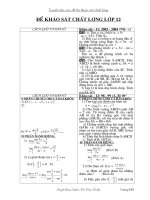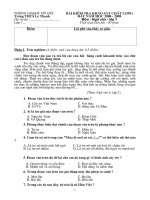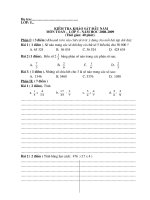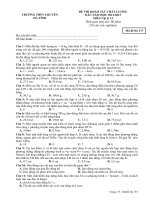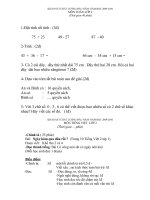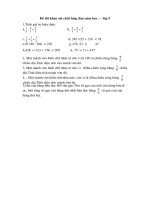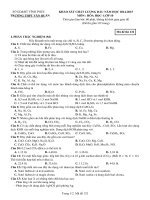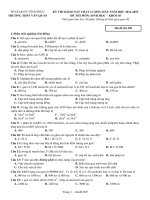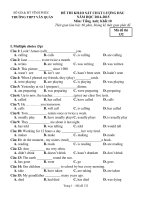Đề và đáp án các môn khảo sát chất chất lượng đầu năm học 2021-2022 - Khối 11.
Bạn đang xem bản rút gọn của tài liệu. Xem và tải ngay bản đầy đủ của tài liệu tại đây (405.09 KB, 4 trang )
<span class='text_page_counter'>(1)</span>SỞ GD – ĐT BẮC NINH TRƯỜNG THPT THUẬN THÀNH SÔ 1. Họ và tên: ................................................................. ĐỀ KHẢO SÁT CHẤT LƯỢNG ĐẦU NĂM HỌC NĂM HỌC 2021 - 2022 MÔN: TIẾNG ANH 11 Thời gian làm bài: 60 phút (không kể thời gian phát đề) Mã đề 101. Số báo danh: .............. Mark the letter A, B, C, or D on your answer sheet to indicate the sentence that best combines each pair of sentences in the following questions. Question 1. I didn’t tell her the truth. Now I regret it. A. I wish I had told her the truth. B. After I had told her the truth, I regretted it. C. If only I told her the truth. D. If I told her the truth, I wouldn’t regret now. Question 2. Helen wrote a novel. He made a cowboy film, too A. Helen wrote not only a novel but also made a cowboy film. B. Not only did Helen write a novel but she also made a cowboy film. C. Helen both wrote a novel as well as made a cowboy film. D. Helen either wrote a novel or made a cowboy film. Mark the letter A, B, C, or D on your answer sheet to indicate the word CLOSEST in meaning to the underlined word in each of the following questions. Question 3. The gender gap in primary education has been eliminated. A. difference B. inconsistence C. similarity D. variety Question 4. Experiences at work help women to widen their knowledge. A. spoil B. eliminate C. broaden D. restrict Mark the letter A, B, C, or D to indicate the word whose underlined part differs from the three in pronunciation in each of the following questions. Question 5. A. culture B. sustain C. butterfly D. public Question 6. A. balance B. nature C. manage D. campfire Read the following passage and mark the letter A, B, C, or D on your answer sheet to indicate the correct answer to each of the questions. EDUCATION IN THE FUTURE Education is another area of social life in which information technology is changing the way we communicate. Today's college students may not simply sit in a lecture or a library to learn about their field. Through their computers and the wonders of virtual reality they can participate in lifelike simulated experiences. Consider the following scenario of the future of education made possible through developments in information technology. For children over the age of 10, daily attendance at schools is not compulsory. Some of the older children attend school only once or twice weekly to get tutorial support or instruction from a teacher. For the most part, pupils are encouraged to work online from home. Students must complete a minimum number of study hours per year; however, they may make up these hours by studying at home at times that suit their family schedule. They can log on early or late in the day and even join live classes in other countries. In order to ensure that each student is learning adequately, computer software will automatically monitor the number of hours a week each student studies on-line as well as that students' learning materials and assessment activities. Reports will be available for parents and teachers. The software can then identify the best learning activities and condition for each individual student and generate similar activities. It can also identify areas of weak achievement and produce special programs adjusted to the students’ needs. Question 7. What is the topic of the passage? A. The effect of information technology on education B. Students can know about their weak aspects to focus C. Computer software will make sure students learn at home D. students don't have to go to school any more Question 8. How many times are children who are older than 10 required to go to school weekly? A. no time B. three times C. four times D. once or twice Question 9. The word “encouraged” in the paragraph 2 mostly means_________. Mã đề 101. Page 1/4.
<span class='text_page_counter'>(2)</span> A. stimulated B. permitted C. suggested D. allowed Question 10. The word “It” in paragraph 2 refers to _____. A. software B. student C. activity D. condition Question 11. What is NOT TRUE as a benefit of information technology to the students? A. Students' studying time won’t be monitored B. Students can stay at home to learn C. Students can learn at times that suit their schedule D. Students' weak achievement can be identified. Mark the letter A, B, C, or D on your answer sheet to indicate the most suitable response to complete each of the following exchanges. Question 12. - “Shall we go boating tomorrow?” - “______. The weather report says a storm is coming”. A. Sure B. That’s a good idea C. I’m afraid we can’t D. That’s a deal Question 13. Hana and Jenifer are talking about a book they have just read. - Hana: “The book is really interesting and educational.” - Jenifer: “______” A. Don’t mention it. B. That’s nice of you to say so. C. I’d love it. D. I couldn’t agree more. Mark the letter A, B, C, or D on your answer sheet to indicate the underlined part that needs correction in each of the following questions. Question 14. They are having her house painted by a construction company. A. painted B. construction C. having D. her Question 15. In order to build progress in speaking skill, you need to practice everyday. A. In order to B. skill C. practice D. build progress Question 16. My mother and her friends always went out together every weekend A. together B. went C. and D. friends Mark the letter A, B, C, or D on your answer sheet to indicate the word which differs from the other three in the position of the primary stress in each of the following questions. Question 17. A. vegetable B. charity C. injury D. volunteer Question 18. A. disposal B. animal C. poverty D. energy Read the following passage and mark the letter A, B, C or D on your answer sheet to choose the word or phrase that best fits each other numbered blanks. Father's Day was created to complement Mother's Day. Like Mother's Day (19) ______ honors mothers and motherhood, Father's Day celebrates fatherhood and paternal bonds; it highlights the (20) _______ of fathers in society. Many countries celebrate it on the third Sunday of June, but it is also celebrated widely on other days. Historically, Sonora Smart Dodd was the woman behind the celebration of male parenting. Her father, the Civil War veteran William Jackson Smart, was a single parent who (21) _______ his six children there. After hearing a sermon about Jarvis' Mother's Day in 1909, she told her pastor that fathers should have a similar holiday honoring them. Although she initially suggested June 5, her father's birthday, the pastors did not have enough time to prepare their sermons, and the celebration was deferred to the third Sunday of June. The first celebration was in Spokane. Washington at the YMCA (Young Men's Christian Association) on June 19,1910. Since then it has become a traditional day (22) ________ year. In recognition of what fathers do for their families, on this day people may have a party celebrating male parenting or simply make a phone call or send a greeting card. (23) _________, schools help children prepare handmade gifts for their fathers many days before the celebration. Question 19. A. when B. who C. where D. which Question 20. A. impact B. conquest C. effect D. influence Question 21. A. took B. realized C. made D. raised Question 22. A. other B. every C. another D. any Question 23. A. However B. Besides C. Then D. In contrast. Mã đề 101. Page 2/4.
<span class='text_page_counter'>(3)</span> Mark the letter A, B, C, or D on your answer sheet to indicate the word OPPOSITE in meaning to the underlined word(s) in each of the following questions. Question 24. She was given a prize for her achievement in classical and traditional music. A. failure B. accomplishment C. success D. feat Question 25. Researchers believe tourists disrupt animals in their natural habitat. A. organise B. disturb C. confuse D. mix up Mark the letter A, B, C, or D on your answer sheet to indicate the sentence that is closest in meaning to each of the following questions. Question 26. “Would you like to come out to dinner with me tonight, Jenny?” Paul said. A. Pau offered Jenny to go out to dinner with him that night B. Paul invited Jenny to go out to dinner with him that night. C. Paul insisted on Jenny going out to dinner with him that night. D. Paul suggested that Jenny go out to dinner with him that night. Question 27. You are able to go out with your friend this evening A. You should go out with your friend this evening. B. You needn’t go out with your friend this evening. C. You can go out with your friend this evening. D. You musn’t go out with your friend this evening. Question 28. The last time I saw her was three years ago. A. I have often seen her for the last three years. B. I saw her three years ago and will never meet her C. I have not seen her for three years. D. About three years ago, I used to meet her. Read the following passage and mark the letter A, B, C, or D on your answer sheet to indicate the correct answer to each of the questions. For hundreds of years, giving flowers has been a social means of communication. In the United States, flowers are often given during rites of passage, for commemorating special occasions or as a heartfelt gift between loved ones and friends. Flower gifting also occurs in most countries around the world. However, the meanings and traditions often vary. While students traditionally gave their favorite teacher an apple in past years, in China, teachers are given flowers. Peonies are by far the flower most often given in China. They are also quite popularly used for weddings. Strangely, potted plants are not considered a pleasant gift among Asian cultures. The people believe that like a plant confined by a pot, the gift symbolizes a binding or restriction. In Russia, in lieu of giving birthday presents, the guest of honor receives a single flower or an unwrapped bouquet. Floral arrangements or baskets are not given. Russians celebrate a holiday known as Woman’s Day. Traditional gifts include red roses, hyacinths or tulips. When there is a funeral or other occasion where someone wishes to express sympathy, carnations, lilies or roses are given in circular configurations, which signify the transition of birth, life and death to rebirth. In this instance, the color of choice is commonly yellow. For joyous occasions, arrangements and bouquets generally contain an odd number of flowers. In the times of ancient Rome, brides carried flowers to scare away evil spirits and encourage fertility. The Dutch believed that flowers were food for the soul. When invited to someone’s home in Great Britain, it is tradition to bring a gift of flowers. All types are acceptable except white lilies, which are usually seen at funerals. Not unlike the United States, red roses are a symbol of love. Flowers are generally gifted in odd numbered increments regardless of the occasion. However, the Brits also have superstitions regarding the number 13, so the number is avoided. In the southern region of the continent, flowers are traditionally given during Christmas. Egyptians are much more conservative and restrict flower gifting to funerals and weddings. While certain flowers may have significant meanings for some, flowers in Las Vegas and across the United States flowers are an accepted gift for any reason desired. Question 29. What does the topic mainly discuss? A. The kinds of flowers people often give others in different cultures. B. The different meaning of flowers in different cultures. C. The comparison of giving flowers between Asian and European cultures. D. The fascinating tradition of giving flowers. Question 30. What could the word “fertility” in paragraph 4 best be replaced by? A. happiness B. loyalty C. fecundity D. good spirit Question 31. Why should not you give a potted plant to an Asian? A. As this gift is often given at weddings in Asia. B. Because the Asian students like to give an apple or flowers to others. Mã đề 101. Page 3/4.
<span class='text_page_counter'>(4)</span> C. Since this gift is believed to symbolize a binding and limitation in Asia. D. Because the Asian prefer to be given flowers. Question 32. The word “superstitions” in paragraph 4 is closest in meaning to _______. A. deep-seated belief B. unfounded belief C. religious belief D. traditional belief Question 33. What does the word “They” in paragraph 2 refer to? A. Teachers B. Flowers C. Peonies D. Students Question 34. According to the passage, the following flowers are given at Woman’s Day in Russia, EXCEPT _______. A. red roses B. hyacinths C. yellow roses D. tulips Question 35. It can be inferred from the passage that _______. A. Flowers given in Britain are in even numbers in any case. B. People can give flowers to the American in any occasion. C. Egyptians are rather comfortable when receiving flowers at funerals and weddings. D. At the funerals in any cultures, flowers are gifted in circular configurations. Mark the letter A, B, C, or D on your answer sheet to indicate the correct answer to each of the following questions. Question 36. At the church ceremony, the couple have to make their wedding _____. A. invitations B. cakes C. vows D. flowers Question 37. He went to Ha noi yesterday , ___? A. does he B. didn’t he C. did he D. doesn’t he Question 38. The doctor decided to give her a thorough examination ________ he could identify the causes of her illness. A. so that B. after C. so as D. unless Question 39. He suffers ______headaches. A. with B. by C. in D. from Question 40. ______ for twelve hours, I felt marvelous. A. have slept B. have been slept C. Having slept D. Having been slept Question 41. The greater the demand, _____the price. A. the higher B. the highest C. the high D. higher Question 42. Some recent years, the number of people who are out of ____ is rapidly increasing A. money B. way C. paper D. work Question 43. ______ the bad weather, his family had a wonderful holiday with a lot of interesting activities A. Despite B. Because C. Although D. Because of Question 44. Learning about cultural differences in politeness helps you avoid a lot of _____. A. embarrassing B. embarrass C. embarrassment D. embarrassed Question 45. When we came in, they ……the meal for us. A. preparing B. were preparing C. prepare D. prepared Question 46. By the time I go to bed tonight, I _____ my work for the day. A. will have finished B. have finished C. finish D. will finish Question 47. In Germany, it is important to arrive _____time when you are invited to someone’s house. A. before B. on C. in D. after Question 48. It is acceptable to touch _____person on _____shoulder in a conversation? A. a- the B. the- a C. a- a D. the- the Question 49. The road to our village _____ next year. A. is widened B. will widened C. can widened D. will be widened Question 50. Some high school students often_____helping the disadvantaged or handicapped children. A. clean up B. participate in C. look after D. make out ------ HẾT ------. Mã đề 101. Page 4/4.
<span class='text_page_counter'>(5)</span>
